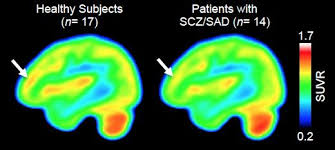Schizophrenia and Bipolar Disorder share several similarities, few if any of which are of more consequence than the impeded function of the body’s Wnt pathways. The Wnt signaling pathways are incredibly important in both brain development, as well as function and regulation of the nervous system. Due to the Wnt pathways importance in brain development and in turn function, it made sense to take a look at both types of Wnt signaling; canonical (B-Catenin dependent), and non-canonical (B-Catenin independent). 
What researchers found was that both in Schizophrenia, and Bipolar Disorder, there was a dysregulation of mRNA expression of canonical Wnt signaling genes and indications of an uptick in non-canonical Wnt signaling. This problem is twofold. The initial issue is the dysregulation results in an inhibition of canonical Wnt signaling, and a lower B-Catenin level. The second part of this problem, is that non-canonical signaling ALSO inhibits canonical signaling, driving the B-Catenin level down even further. So due to this dysregulation in both diseases, we see them characterized by Low B-Catenin levels which goes hand in hand with low canonical Wnt signaling. However, there is a third component which comes in the form of glycogen synthase kinase 3 beta (GSK-3β). In Schizophrenia there is also a large reduction in the amount of GSK-3βpresent whereas in Bipolar Disorder the GSK-3βis overexpressed. This leads to more questions, as GSK-3β is a Wnt inhibitor as well. In Bipolar Disorder, the overexpression can be dealt with through a GSK inhibitor like lithium. However it was not clear if this process could also be looked upon to increase Wnt signaling and B-Catenin levels in a Schizophrenia model as well. While currently in other models, pharmaceutical inhibition of GSK3, or non-canonical Wnt antagonists have resulted in a successful increase of B-Catenin dependent signaling, this process, as well as the etiology in Schizophrenia remain a mystery.
